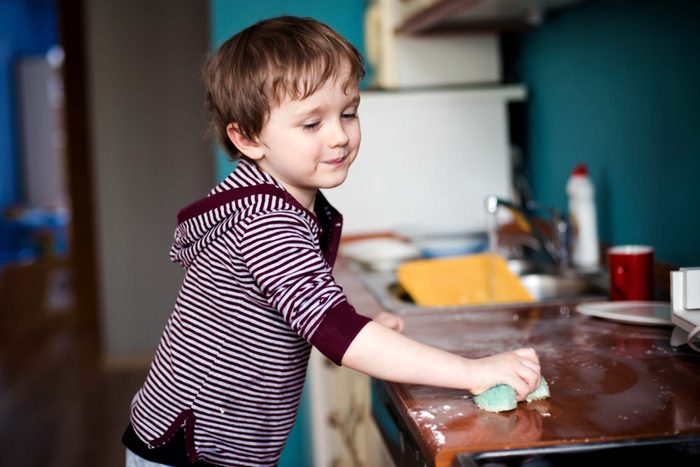
Eldest children are leaders
Eldest children tend to be ambitious, driven leaders. “The firstborn gets a lot of focus and attention as there are no other children for distraction,” says child and family therapist Meri Wallace, LCSW, author of Birth Order Blues. “The child can get lots of teaching, and so can grow up to feel very self-confident and strong enough to be a leader.” This leadership role was noted by Alan Stewart, psychologist at University of Georgia, in his 2012 definitive analysis of birth order studies. Plus, parents often task firstborns with helping with younger siblings and chores, which develops their leadership role. “Mom will say, ‘I have to take a shower, go watch the baby for a while,’ so the firstborn knows how to be responsible and nurturing,” Wallace says. “The firstborn gets lots of education in being a leader.” This is how your birth order can affect your health?
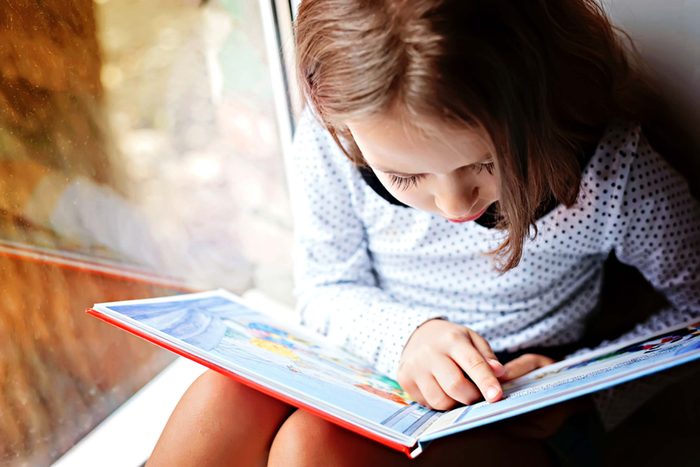
Older children are smarter
Much research, including a recent study from The University of Edinburgh, shows that oldest children tend to have higher IQs than subsequent children. This could be because parents provide more mental stimulation to their firstborn. “The time that parents have available to read to their first child, to explain things, is greater,” Wallace says. “Parents tend to talk to the oldest more—whether they’re home or going for a walk outside. Parents might ask ‘Why do you think the sky is blue?’ or ‘Why do you think the leaves are turning color?'” Older children then develop more analytic and conceptual thinking skills. This could be why 21 of the first 23 NASA astronauts were firstborns. “They have larger vocabularies and learn to think like adults, which is why they are so responsible,” says Linda Campbell, PhD, psychologist at University of Georgia and a leading researcher in birth order. But the downside of this added parental attention is that firstborns feel more pressured to do well. “The oldest can become a perfectionist, and then worry that if they don’t get things perfect they’re not valuable or lovable,” Wallace says.
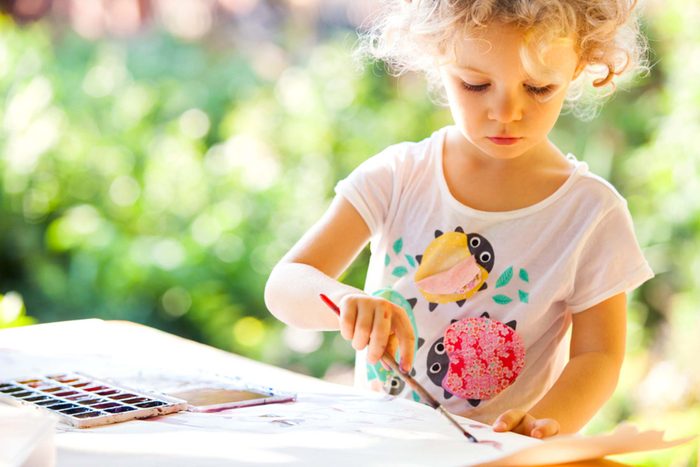
Middle children are creative
“Marsha, Marsha, Marsha!” Everyone remembers Jan Brady’s classic middle-child cry on The Brady Bunch. And it does seem that the stereotype is often true. “The parents are very busy with the older child, who is either going on their first sleepover or starting high school or going on the first date,” Wallace says. “And the younger child needs so much help, so the middle child can really get lost in the shuffle.” Because everything the middle child is doing the eldest child has done before, they may feel lost. “The middle child doesn’t have a clear identity,” Wallace says. Even so, the constant companionship of siblings could be the reason middle children are less likely to be diagnosed with emotional disorders, according to a 2013 study from Spain. And having to find their own niche can often lead the middle child to branch out into other areas and become more creative, without the parental expectations eldest children face. “The middle child finds interesting ways to get attention, so you often get a middle child who’s an artist or a jokester,” Wallace says. If you’re a middle child and think you have middle child syndrome, think again, middle children have many hidden powers.

Middle children are good negotiators
Children born in the middle often end up playing the role of peacemaker between their siblings, and as such, also do well in leadership roles. A surprising fact: 52 percent of U.S. presidents, including Abraham Lincoln and John F. Kennedy, were middle kids, according to Katrin Schumann, co-author of The Secret Power of Middle Children. “It is true that middle children are squeezed, but they are great negotiators and compromisers because they have been called upon their entire lives to do so,” Dr. Campbell says. Their people skills were evidenced in a study showing middles do better in group situations than oldest or youngest children. “The middle child tends to know how to get along with people and calm a situation down—they can understand things from both angles,” Wallace says. They also tend to hold fairness and justice in high esteem: Martin Luther King, Jr., and Nelson Mandela were also middle children. Their willingness to compromise also leads middles to be happier in marriage, according to an Israeli happiness study, says Schumann.

Youngest children often become entrepreneurs
We think of the baby of the family as holding a special place in their parents’ hearts, and while that may be true, it’s not because their parents give them more attention. In fact, they can often end up feeling left out. “The younger one feels like, ‘Hey, how come my older brother can ride on a two-wheeler and I can only ride on a tricycle, what’s wrong with me?'” Wallace says. “Young children do not understand the differences between them and the older kids, and so the youngest child can feel very inadequate and flawed.” Plus, older siblings often don’t want the younger siblings around. “I watched an older sister who was about three or four setting up a tea set really carefully, and then along comes the toddler straight towards the tea set, and the older one is going, ‘Stop! Stop!'” Wallace says. “So the youngest often feels unwanted and neglected.” They also have less opportunity to get their parents’ attention. “The youngest can be cute because of ‘forever being the baby,’ but manipulative because family don’t take the youngest seriously,” Dr. Campbell says. To an even greater extent than middle children, youngest siblings have to find a way to blaze their own trail, as evidenced by a study from the U.K. that showed last-borns were most likely to become entrepreneurs.
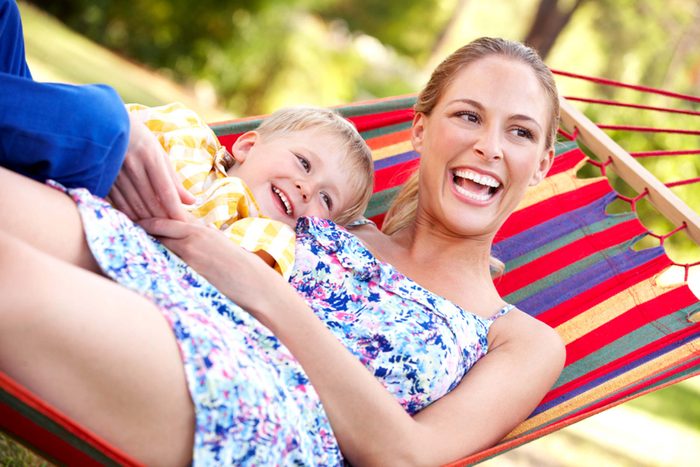
Youngest children are more relaxed
Because parents are unpracticed with their eldest, they tend to be uptight with them, a trait that can rub off on the child. But by the time they get to their youngest, parents know what they are doing, so that child “benefits because the parents are calmer—they know they raised a three-year-old who they didn’t kill,” Wallace says. “The parents feel more relaxed and easygoing, and so the youngest tend to be more relaxed kids.” Plus, because the parents’ attention is divided, the youngest child tends to get away with more. “The rules for the second child are much more flexible than they were for the first child,” Wallace says. As a result of their easygoing nature, youngest children are often charming and humorous. According to a recent YouGov study, youngest children are the funniest sibling in the family, so it’s no surprise Billy Crystal, Goldie Hawn, Jim Carrey, and Steve Martin are all youngest children. “The older one got to school first so that base is covered,” Wallace says. “So it’s like, “Okay, I’m not going to be the intellect of the family, so I’m going to go do something unique to get attention!'” Here are more ways siblings affect you as a grown-up.
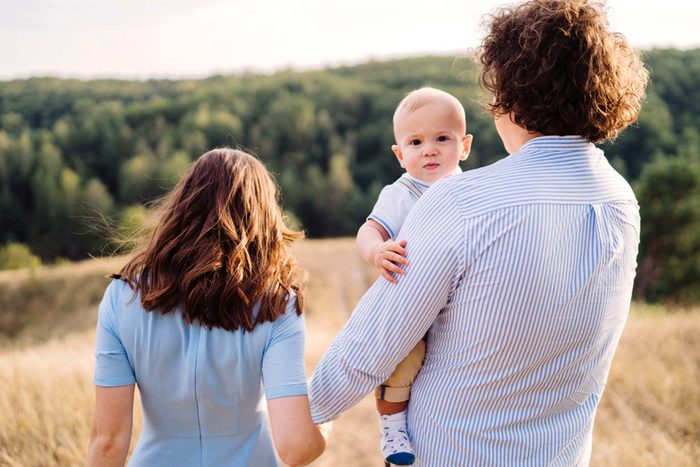
Only children act like both an eldest and youngest
The only child in a family gets all of their parents’ attention for life—which has its pros and cons. “You’re the firstborn and the last-born, so you have a mixture of experiences,” Wallace says. So while you might be a high achiever, you are also babied like the youngest would be. At the same time, “only children are little adults because they live in an adult world,” Dr. Campbell says. But don’t feel too bad for only children—a study from the U.K. showed only children are happier because they don’t have to deal with sibling rivalry. Although the lack of siblings may cause them to have lower social skills in kindergarten according to research, by fifth grade, they’ve caught up with their peers. And contrary to popular thinking, analysis shows onlies aren’t lonely, and the resources their parents can devote to them often lead them to be successful.
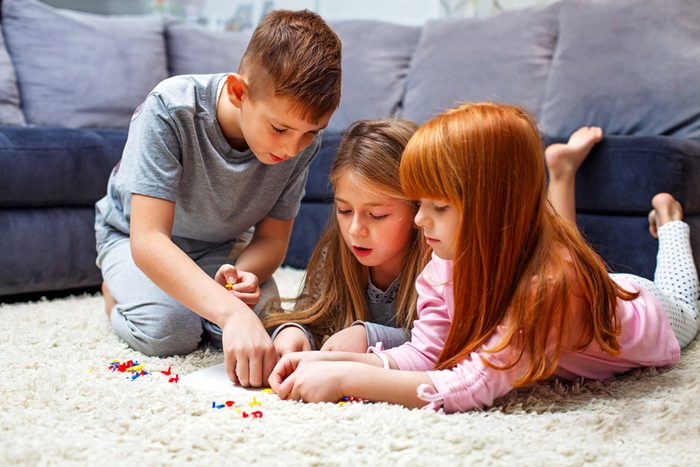
Family size affects middle kids most
The notion of the “eldest, middle, and youngest” birth order is predicated on no more than three children in a family—but what happens when there are more than that? Not surprisingly, middle children tend to be affected the most. “If you’re the middle child of many kids, now you really have problems establishing an identity, and you really have trouble getting attention, while the oldest and youngest still have the same focus,” Wallace says. But the benefits of being a middler seem to be more pronounced in big families, too—a study from the University of Ohio found that each additional sibling drops their future chances of divorce by two percent. Here are 18 things only people from large families know.
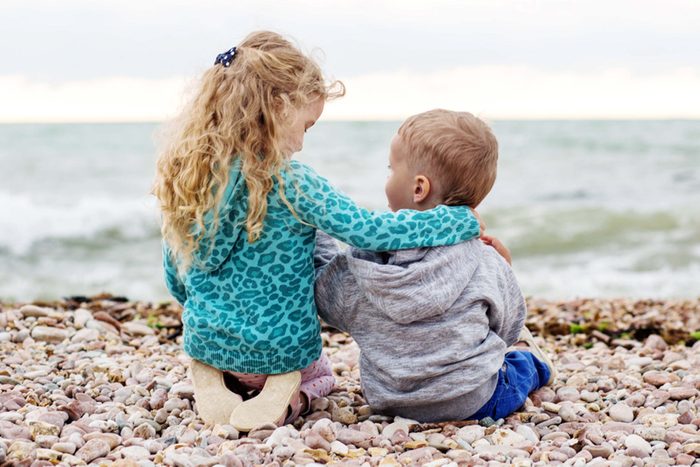
Mind the gap—in siblings’ ages, that is
The closeness in age between siblings intensifies birth order traits. “Studies find that kids closer in age are more competitive,” says Wallace, because they have more similar needs from their parents. This is rooted in evolution by having to compete with siblings for survival. “If you watch little birds in a nest, they’re battling just to get the food,” Wallace says. This is why, contrary to popular thinking, twins can be fiercely competitive, she says. So is there an “ideal” age gap between siblings? “Four-year-olds tend to start finding their social life and school more important than Mommy and Daddy,” Wallace says. “The older the firstborn is, the more you can talk about the experience [of getting a new sibling] and how they are feeling.” With more than a five-year gap, some psychologists believe that birth order “resets,” so that a middle child can actually take on the traits of a firstborn. But a very large age gap, as in the case of a second or blended family, can throw even older children for a loop.
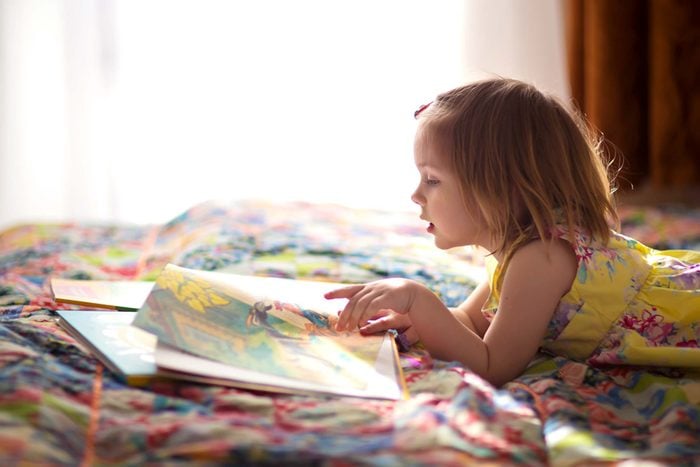
Why you may not identify with your birth order
“But I don’t have the typical traits of a middle child!” you say. Some may point to this as evidence that birth order really doesn’t matter—but Dr. Campbell and her colleague Dr. Alan Stewart have developed a theory why this may occur. “Only 60 percent of all people actually identify with their actual chronological birth order,” Dr. Campbell says. “We developed the ‘psychological birth order’ inventory 15 years ago, and it remains the only inventory that measures how a person actually feels and identifies with a place in their family.” A different psychological and chronological birth order might occur if the eldest sibling is unwilling or unable to take up the reigns as the sibling leader—then the middle might become a de facto firstborn. “If your oldest child fails miserably at school then your second child might become the brain of the family, or if the oldest child is sick then the second child can take on firstborn traits because that’s the person you turn to to help,” Wallace says.

Gender can throw birth order traits off
Another reason you might not display the typical traits of your birth order is what sex you are. “Culture and family tradition come into this a lot,” Wallace says. “If a boy is valued more, for example, a second-born who’s a boy might be elevated in some cultures. He might be the one to go to college, not the firstborn girl.” Or the opposite may occur—a recent U.K. study found that firstborn girls are more ambitious, with 13 percent more likely to aspire to attend graduate school than firstborn boys. Also, the first girl in the family might be expected to help with care-taking of younger siblings instead of an older brother. “The expectation on the firstborn girl to take over her mom’s burdens in a lot of cultures is there,” she says. The family dynamic of how many girls and how many boys also factors in, Wallace says—if you are the only boy among many girls, or vice versa, you may get special treatment by your parents, but you may be neglected by your siblings who identify with each other more than with you. Find out what sisters learn from each other.
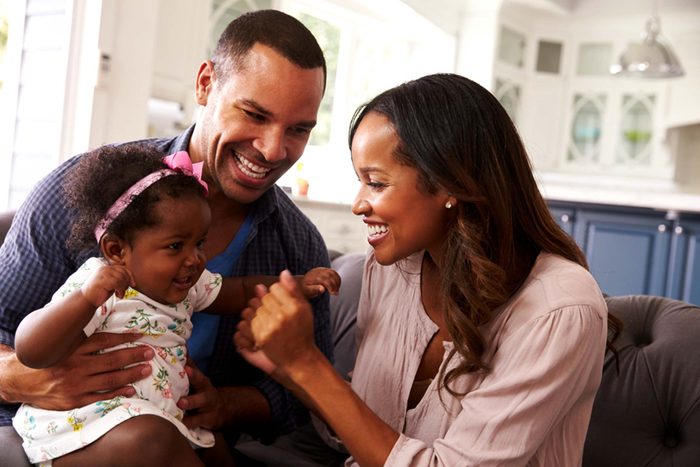
Your parents’ birth order affects yours, too
The final piece of the puzzle reflects how birth order has a cumulative effect among generations. “In my book I wrote a chapter on your own birth order [as a parent]—how if you were a firstborn you might identify with your firstborn more and be more supportive,” Wallace says. It might even be subconscious—you might unwillingly “become your mother” because that’s the model you have. “You might either emulate your experience growing up or you may try to correct it if you felt too pressured,” Wallace says. “We tend to gravitate to how we were raised, but we also try to correct it—so it’s hard to know what wins out.”
